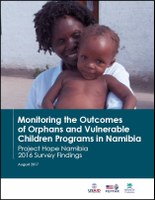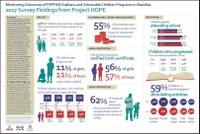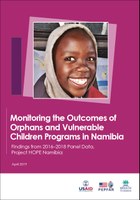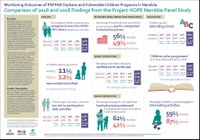Monitoring the Outcomes of Orphans and Vulnerable Children Programs in Namibia
In 2014, the United States President’s Emergency Plan for AIDS Relief (PEPFAR) introduced a set of outcome indicators for programs serving orphans and vulnerable children (OVC), referred to as the Monitoring, Evaluation, and Reporting (MER) Essential Survey Indicators. PEPFAR requires these indicators to be collected every two years by a research organization external to the OVC program. These outcome indicators reflect internationally accepted developmental milestones; together, they measure the holistic well-being of children over time. A standard survey method and tools have been developed to collect these data in countries where PEPFAR is supporting OVC programs. PEPFAR/Namibia asked MEASURE Evaluation—funded by the United States Agency for International Development (USAID) and PEPFAR—to conduct a survey to collect these indicators for Project HOPE Namibia (PHN).
The purpose of this survey was to collect the first round of indicators for enrolled active beneficiaries of PHN. PHN and other partners and stakeholders will use the findings from this survey to meet PEPFAR’s national and global reporting requirements. The findings will also inform program planning by OVC policymakers and program managers in Namibia and across the region.
The following materials present our findings.
Reports
 | Report: Project Hope Namibia 2016 Survey Findings |
|---|---|
 |
|
 |
Report: Findings from 2016–2018 Panel Data, Project HOPE Namibia |
 |












